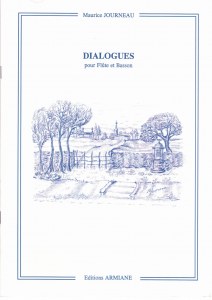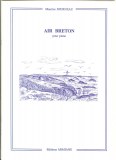Dialogues for flute and bassoon
Reference EAL 485
Maurice Journeau . 5 p (+8)
Born in Biarritz in the Basque Country on November 17, 1898, Maurice Journeau studied piano as a child and began composing as a teenager. Shortly after his Baccalaureate, he was mobilized in April 1917, which interrupted his first musical attempts. He was then able to study composition at the Ecole Normale de Musique de Paris from 1920 to 1922 inclusive, attending classes with Nadia Boulanger on rue Ballu. From 1921, his "Menuet" and his "Valse" marked the beginning of his official composition and the publishing house Maurice Sénart (disappeared) will publish his youthful works until 1931. At the end of his studies, he had to go back to Biarritz, with the advice of his masters to always continue to write.
As soon as he got married, Maurice Journeau moved to Nice where he lived for ten years (from 1926 to 1936). There he wrote, among other things, works for violin, premiered by Gil Graven, soloist of the Concerts Internationaux.
In 1936, he moved to Paris and it is there that he composed most of his works, mainly for piano (his favorite instrument) and for chamber music. The 50's were characterized by a few radio recordings, by writing for wind instruments and for orchestra, by a concern for renewal (including within the framework of a very personal dodecaphony, but soon abandoned). The 70's, period of great maturity, will see the blossoming of works of Sacred Music. In 1984, Maurice Journeau voluntarily put an end to his writing.
At the end of 1992, his unpublished music began to be discovered by artists and the public, and then to be regularly published by Editions COMBRE. In 1998, Maurice Journeau was able to see his Centenary celebrated in several cities in France and Germany. This was the beginning of a discography allowing a wider diffusion of works for piano and strings. On June 9, 1999, Maurice Journeau passed away in Versailles, having witnessed the rise of his music.
He left us a repertoire of about 75 works, mainly for piano and chamber music, but also for orchestra and organ, and very incidentally for voice and harpsichord. Not to mention numerous arrangements of his own works, all written by himself. visit www.journeau.com
Year of edition :2010
Instrument 1 :



